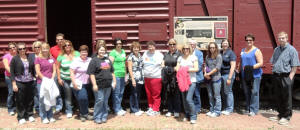|

Left to right: Megan Ferguson, Keri Elliot, Karen James,
Linda Splain, Greg Guenther, Pam Woith, Brenda Bartley,
Kristi Ford, Beth Ann Polley, Jena Reed, Rhonda Brown, Doris
Morehouse, Diana Parks, Kathleen Glenn, Megan Charlton,
Laura Schahl, Emily Morehouse, Sue Leonard and Matthew
Hagaman. They represent six area schools. |
Area teachers participate in Summer Agriculture Institute
 Send a link to a friend
Send a link to a friend
[June
18, 2013]
Nineteen teachers took part in
this year's Logan, Mason, Menard and Sangamon County Summer
Agriculture Institute.
|
|
 This is the 11th year that training of this type has been offered
for teachers. They are taken to farms in each of the four counties
to learn about the broad range of farms and farmers operating in the
area. The training also brings teachers into the classroom to share
curriculum that will help them use their new knowledge in their
classrooms. The ability to teach a teacher is a way to share
knowledge, not just with them, but with the hundreds of youth they
will influence during their careers. This is the 11th year that training of this type has been offered
for teachers. They are taken to farms in each of the four counties
to learn about the broad range of farms and farmers operating in the
area. The training also brings teachers into the classroom to share
curriculum that will help them use their new knowledge in their
classrooms. The ability to teach a teacher is a way to share
knowledge, not just with them, but with the hundreds of youth they
will influence during their careers.The tour began in Sangamon
County, where the group visited Ramsey Grain to learn about grain
elevators and the way farmers market their products. Rich Ramsey
also shared information about his bees and beehives. The group moved
on to Randy and Toni Krone's farm to learn more about growing
Christmas trees and raising pigs.

The second day of the institute, the group moved to Logan County
and started the day at the Anderson cob plant, learning about the
process of turning corn cobs into usable products. Keith Birmbaum at
Remington Seed hosted the next stop and gave a great explanation of
the seed business. The group was even able to see bags of seed being
palletized by a robot and bulk seed bags being filled. From there it
was on to Gail's Pumpkin Patch, rural Beason, where Dave and Gail
Sasse told about their pumpkin patch and the agritourism business.
After lunch the group was hosted by Homer Hamblin at the J.H. Hawes
Antique Grain Elevator in Atlanta. The day ended at the Irwin Dairy
Farm, where participants enjoyed talking with the entire Irwin
family, who took time away from cutting haylage to give a tour of
their milking parlor and to speak about their cattle.
[to top of second column] |
 After a weekend break, the class resumed in Menard County. The
group spent time with Doug, Dee Dee and John Gellerman, learning
about their herd of Shorthorn cattle. The Gellermans talked with the
visitors about raising beef cattle and also about showing cattle.
The teachers moved on to learn about advances in farm machinery
technology and were hosted by Kyle Winkelmann at his farm in Tallula.
Winkelmann spoke about the use of GPS and mapping systems, which
help farmers in many aspects of their work. Just down the road, the
group stopped in to speak with Roy Seaney about his sweet corn
production and produce stand as well as his beautiful greenhouse
operation. After lunch, Mark Lounsberry hosted the group at the Hill
Prairie Winery to explain grape growing and winemaking at his
facility in Oakford.
The last day of the tour took the participants to Mason County,
where they stopped first to learn about the Mahomet Aquifer, which
supplies many irrigation systems in that area. Jeff Smith hosted and
let the group see firsthand how an irrigation systems runs, as well
as giving information about the aquifer. At the next stop, the group
arrived in time to catch Del Monte employees hard at work harvesting
peas, an example of the amazing diversity of crops that are planted
and harvested on Mason County's irrigated ground. The group ended
the tour at the Jake Wolf Fish Hatchery, where large portions of the
state's fish are grown to be stocked in ponds, streams, rivers and
lakes.
Teachers received 28 continuing professional development units
for completing the course, went home with a new appreciation of
farms and farmers, and can share this appreciation with their
students for years to come.
University of Illinois Extension thanks all of the farms and
farmers who took the time out of their busy schedule to host the
group.
[Text from file received from
Amy L. Hyde, University of
Illinois Extension]
|